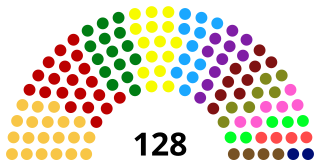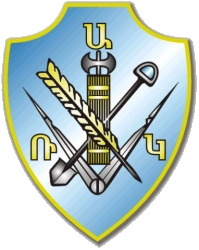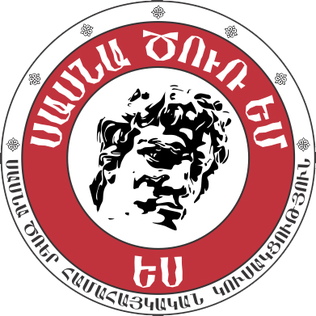Related Research Articles
"Mer Hayreniḱ" is the national anthem of Armenia. It was arranged by Barsegh Kanachyan; the lyrics were written by Mikayel Nalbandian. First adopted in 1918 as the anthem of the short-lived First Republic of Armenia, it was subsequently banned after the country was invaded by then incorporated into the Soviet Union. Following the dissolution of the Soviet Union and the restoration of sovereignty in 1991, the song was re-adopted as the national anthem, albeit with slightly modified lyrics.

The Armenian Revolutionary Federation, also known as Dashnaktsutyun, is an Armenian nationalist and socialist political party founded in 1890 in Tiflis, Russian Empire by Christapor Mikaelian, Stepan Zorian, and Simon Zavarian. As of 2023, the party operates in Armenia, Artsakh, Lebanon, Iran and in countries where the Armenian diaspora is present. Although it has long been the most influential political party in the Armenian diaspora, it has a comparatively smaller proportional presence in modern-day Armenia. As of October 2021, the party was represented in three national parliaments, with ten seats in the National Assembly of Armenia, three seats in the National Assembly of Artsakh and three seats in the Parliament of Lebanon as part of the March 8 Alliance.

The Lebanese Parliament is the national parliament of the Republic of Lebanon. There are 128 members elected to a four-year term in multi-member constituencies, apportioned among Lebanon's diverse Christian and Muslim denominations but with half of the seats reserved for Christians and half reserved to Muslims per Constitutional Article 24. Lebanon has universal adult suffrage. Its major functions are to elect the President of the republic, to approve the government, and to approve laws and expenditure.

The Armenian Democratic Liberal Party, the Ramgavar Party,, also known by its Armenian initials or its English initials ADL is an Armenian political party in the Armenian diaspora including the Middle East, Europe, the Americas and Australia.

Armenian Genocide Remembrance Day or Armenian Genocide Memorial Day is a public holiday in Armenia and the Republic of Artsakh and is observed by the Armenian diaspora on 24 April. It is held annually to commemorate the victims of the Armenian genocide of 1915. It was a series of massacres and starvation of 1.5 million Armenians by the Ottomans. In Yerevan, the capital of Armenia, hundreds of thousands of people walk to the Tsitsernakaberd Genocide Memorial to lay flowers at the eternal flame.
The Armenians in Lebanon are Lebanese citizens of Armenian descent. There has been an Armenian presence in Lebanon for centuries. According to Minority Rights Group International, there are 156,000 Armenians in Lebanon, around 4% of the population. Prior to the Lebanese Civil War, the number was higher, but the community lost a portion of its population to emigration. After surviving the Armenian genocide, and initially settling in shanty towns in Lebanon, the Armenian population gradually grew and expanded until Beirut became a center of Armenian culture. The Armenians became one of Lebanon’s most prominent and productive communities.

The Republic of Artsakh is a republic with limited recognition in the South Caucasus region. The Republic of Artsakh controls most of the territory of the former Nagorno-Karabakh Autonomous Oblast. It is recognized only by three other non-UN member states, Abkhazia, South Ossetia and Transnistria. The rest of the international community recognizes Artsakh as part of Azerbaijan. In November 2012, a member of Uruguay's foreign relations committee stated that his country could recognize Nagorno-Karabakh's independence. In 2012, Armenia and Tuvalu established diplomatic relations and it was expected that Tuvalu may recognize Artsakh's independence. In October 2012, the Australian state of New South Wales recognized Nagorno-Karabakh. In September 2014, the Basque Parliament in Spain adopted a motion supporting Artsakh's right to self-determination and in November 2014, the Parliament of Navarre, also in Spain, issued a statement supporting Artsakh's inclusion in taking part in settlement negotiations.

Gagik Tsarukyan is an Armenian businessman, politician, and former athlete. Tsarukyan is the founder and leader of the Prosperous Armenia political party. He also owns various large-scale businesses and is believed to be one of the richest men in Armenia.
The Mugar family of Greater Boston, Massachusetts, is a prominent Armenian-American family in New England business and in philanthropy, both in the United States and in Armenia. The best known member of the family is Stephen P. Mugar, (1901-1982), who founded the Star Market chain of super markets on which the family fortune was based. In its May, 2004, issue, Boston Magazine ranked the Mugar family sixth in its list of the 50 most influential Boston families.

The Skaff Bloc or Popular Bloc, led by Myriam Skaff, is a political party and an electoral coalition in the Lebanese Parliament that aligned with the Free Patriotic Movement from 2005 to 2009.
The Armenian Mirror-Spectator is a newspaper published by the Baikar Association, in Watertown, Massachusetts.

Baikar is an Armenian language weekly published by the Baikar Association Inc., in Watertown, Massachusetts, United States.

Armenakan-Democratic Liberal Party was an Armenian political party established in 2009 in Yerevan, Armenia as an offshoot of the Armenian Democratic Liberal Party as a result of an internal rift in the traditional and historic Armenian Democratic Liberal Party (ADL) established in Van in 1885 as Armenakan Party.

Paulette Siragan Yaghobian is a Lebanese journalist, television host and politician. She worked as a host in a number of Lebanese and pan-Arab international television stations. Known for the transformational impact she's had in her organizations and the broader community, Paula became one of the experts chosen by the World Bank group as a member of their 'External Advisory Panel for Diversity and Inclusion' as a result of her advocacy for women's rights, her efforts for women empowerment, as well as for being a fierce defender of electoral women quota and a fairer electoral law in Lebanon.

Lebanese nationality law governs the acquisition, transmission and loss of Lebanese citizenship. Lebanese citizenship is the status of being a citizen of Lebanon and it can be obtained by birth or naturalization. Lebanese nationality is transmitted by paternity (father). Therefore, a Lebanese man who holds Lebanese citizenship can automatically confer citizenship to his children and foreign wife. Under the current law, descendants of Lebanese emigrants can only receive citizenship from their father and women cannot pass on citizenship to their children or foreign spouses.

Beirut I is an electoral district in Lebanon. The district elects eight members of the Lebanese National Assembly – three Armenian Orthodox, one Armenian Catholic, one Greek Catholic, one Greek Orthodox, one Maronite and one Minorities.

The Vazgen Sargsyan Military University is a higher educational institution functioning in the system of the Ministry of Defense of Armenia. Its mission is to prepare and train officers capable of implementing defense tasks in peace and war. It is roughly the equivalent to the United States Military Academy at West Point.

Sasna Tsrer Pan-Armenian Party is an Armenian national conservative political party that was founded in September 2018 in the wake of the country's Velvet Revolution.

Philippe Khalil Ziade is a Lebanese-American entrepreneur and the honorary consul of Lebanon in Nevada. He is the founder and chairman of Las-Vegas based Growth Holdings. Ziade is engaged in Lebanese politics and expat affairs.
References
- ↑ Mirror-Spectator, The Armenian (2018-05-17). "Lebanese Elections and the Lebanese Armenian Politics". The Armenian Mirror-Spectator. Retrieved 2022-04-04.